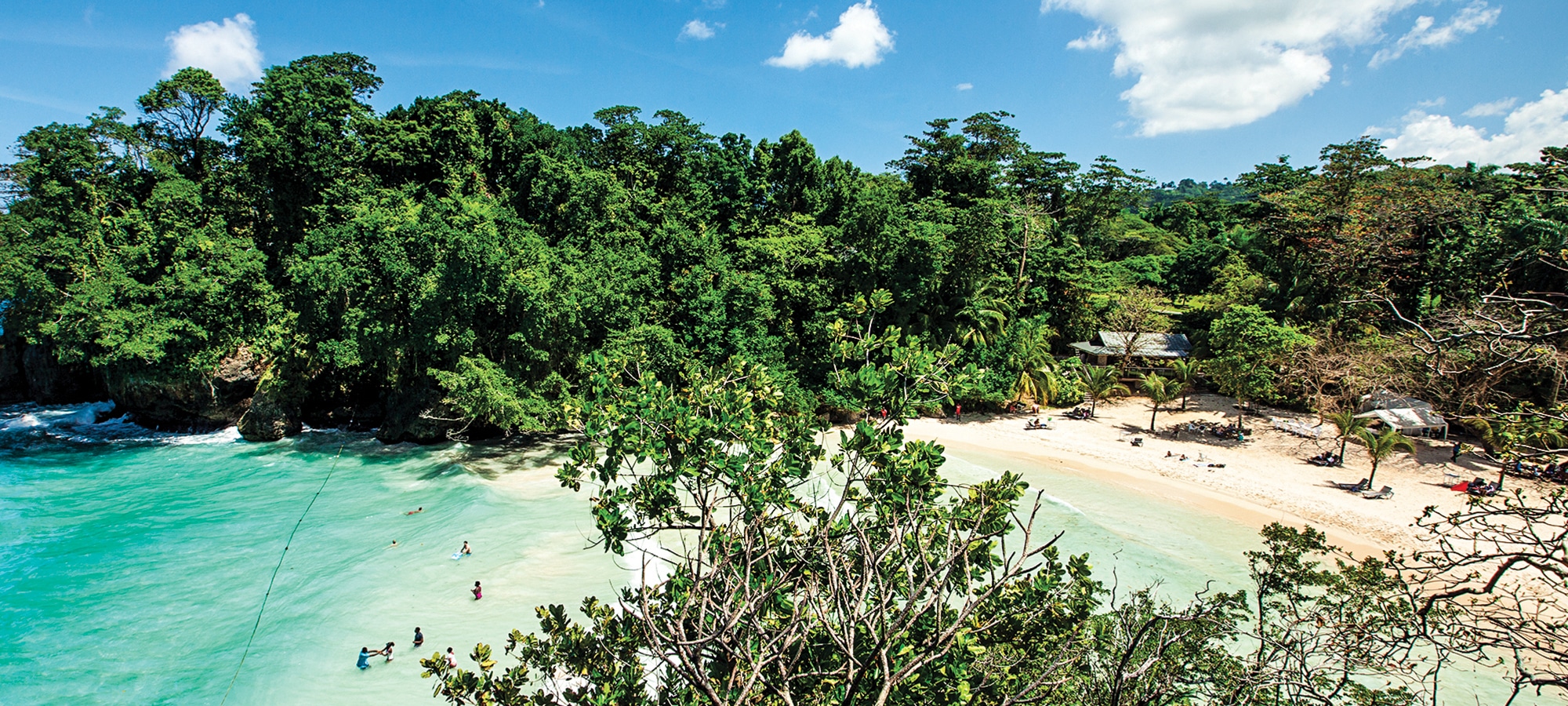The Jamaica Town You Haven't Heard Of ... Yet
Port Antonio, a forgotten slice of northeastern Jamaica, has it all: welcoming locals, gorgeous beaches, cultural authenticity — and, recently, a quiet revival.
There's no better way to feel uncool in Jamaica than to show up early for the Thursday-night Roadblock Party, which is exactly what we've done. Killing time, my friend and I saunter over to buy a shot of rum from a dreadlocked gentleman who appears to have sampled too much of his homebrew. He entertains us by explaining, at length, that having dreadlocks does not mean you are Rasta. Being Rasta is a way of life that requires purity of mind, spirit and body, not just a hairdo.Eventually, the music booms extravagantly, and local revelers — men with gleaming muscles, women wearing sparkling miniskirts — drift up the road. An enormous man wearing a headscarf and medallion necklace strides over and clasps my friend in a bro-hug; he remembers him from a past visit. This party is infamous in Port Antonio, a forgotten slice of northeastern Jamaica that has it all: welcoming locals, gorgeous beaches, cultural authenticity — and, recently, a quiet revival.
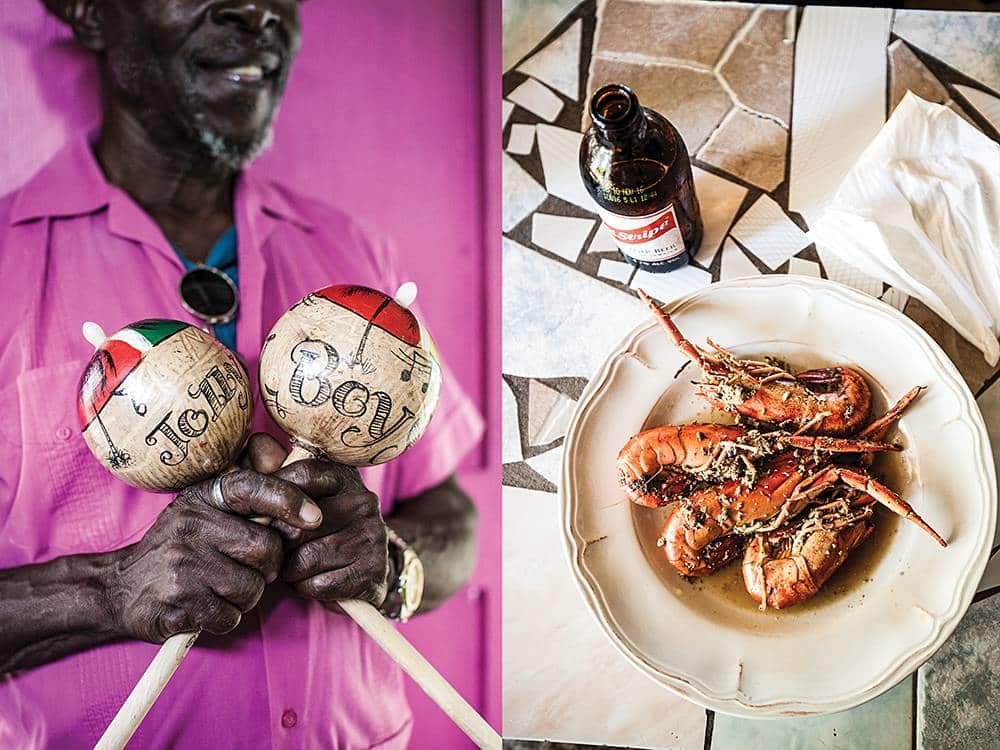
Port Antonio has a long history of receiving Americans. Legend has it that in 1946, a storm hit the coast of Jamaica, and Zaca, the opulent schooner of movie heartthrob Errol Flynn, was forced ashore in Port Antonio for repairs. Until that point, the area's claim to fame was being the banana capital of the world, made so by wealthy Boston businessman Lorenzo Dow Baker in the late 1800s. A consummate wheeler-dealer, Baker cleverly broadcast this verdant stretch of Jamaica as an untrammeled paradise, filling his empty banana boats with hardy tourists from America's Eastern Seaboard. Port Antonio became a retreat for a few nature lovers who reveled in the jungle and beaches surrounding the town.
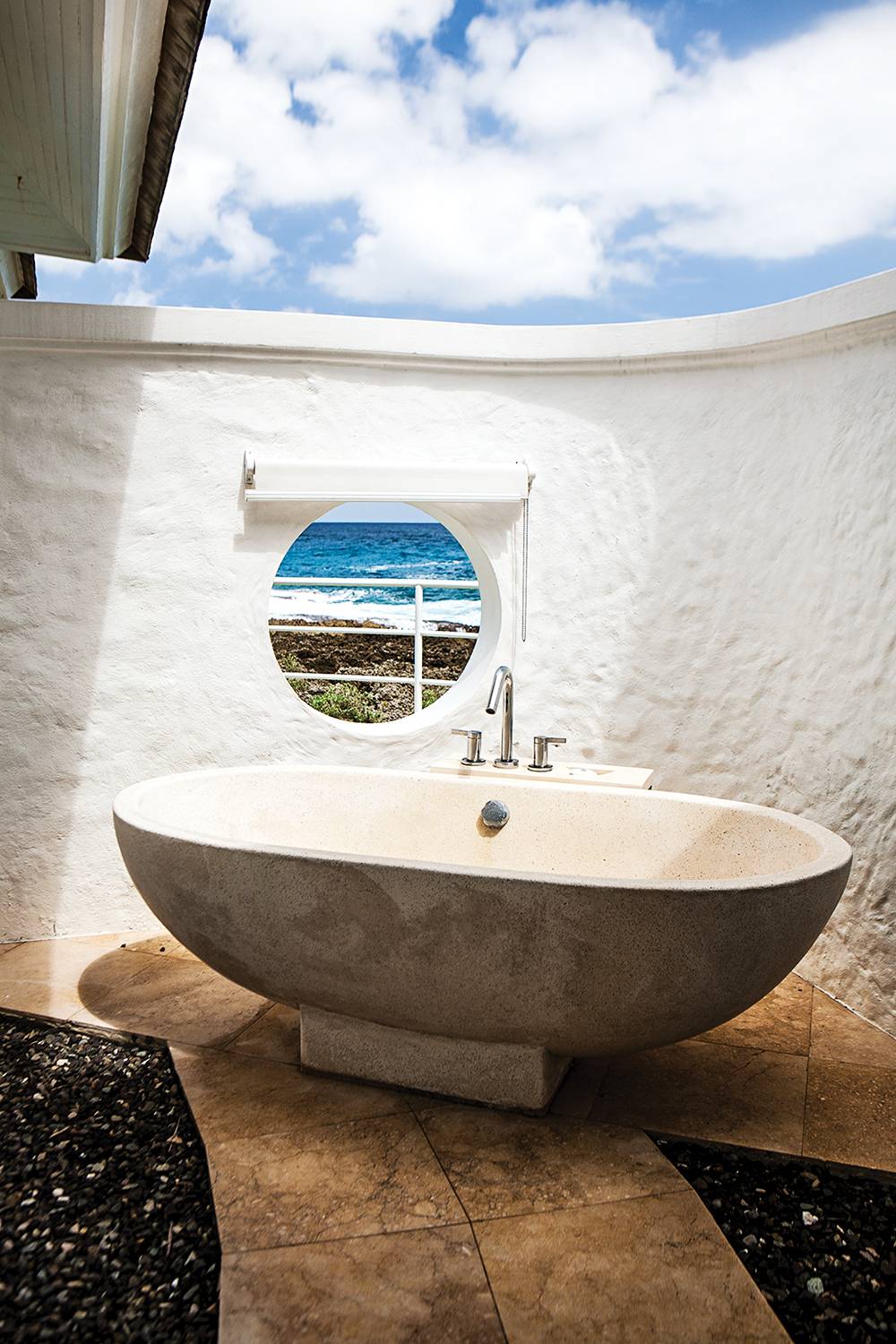
But when Flynn — reputedly a decadent bon vivant — arrived, everything changed. He was enamored with the place, so he bought land, imported champagne by the crate, invited Hollywood's glamour set and put the tiny town on the map. Villas shot up behind wrought-iron gates, hotels appeared, Grace Kelly and Elizabeth Taylor arrived in heels and oversize hats. The Aga Khan built a villa, and Baroness Elizabeth von Thyssen built a Gatsby-esque "castle." For decades to come, Port Antonio, the formerly sleepy seaside town, was abuzz with music, laughter, beautiful people and the pop of champagne corks.
Then in the late 1980s, Gilbert, Ivan and Dennis arrived and trashed the joint. All three hurricanes of enormous ferocity, they tore apart the infrastructure so thoroughly that, to this day, it has not fully recovered. Once-luxury resorts above perfect coves sat abandoned and smashed, the iron-gated villas were left for the jungle to reclaim, the baroness' castle fell into disrepair. The glitterati stopped coming.
But within the last decade, revitalization has been slowly building, and the celebrities — without as much fanfare — are now returning. The castle has reopened as the Trident Castle, an eccentric and huge rental where bands come to film edgy music videos on the black-and-white checkerboard floor, and models host their weddings. A derelict oceanfront hotel had an expensive face-lift and has morphed into the hip, St. Barth-worthy Trident Hotel. Outside of town, glass-front villas are going up on hillsides overlooking the Caribbean Sea. What's more, the likes of Beyoncé, Alicia Keys and Grace Jones visit frequently to record in the state-of-the-art music studio inside the discreetly jet-set Geejam hotel, owned by British music executive Jon Baker (no relation to Lorenzo).
Baker, who has been here for 30 years and was the first to open a hip hotel, is very much a part of the "Renaissance of Port Antonio," as he calls it. "Portie [as it's affectionately known] is the safest part of Jamaica," he tells me. "Crime here is virtually unknown and limited to petty theft." There are fewer tourists, no cruise ships, no chain hotels or restaurants and better beaches. And the locals are friendly to outsiders. "This is the kind of place people visit and end up moving to," Baker elaborates. "It's a real draw for creatives because of its relaxed vibe."
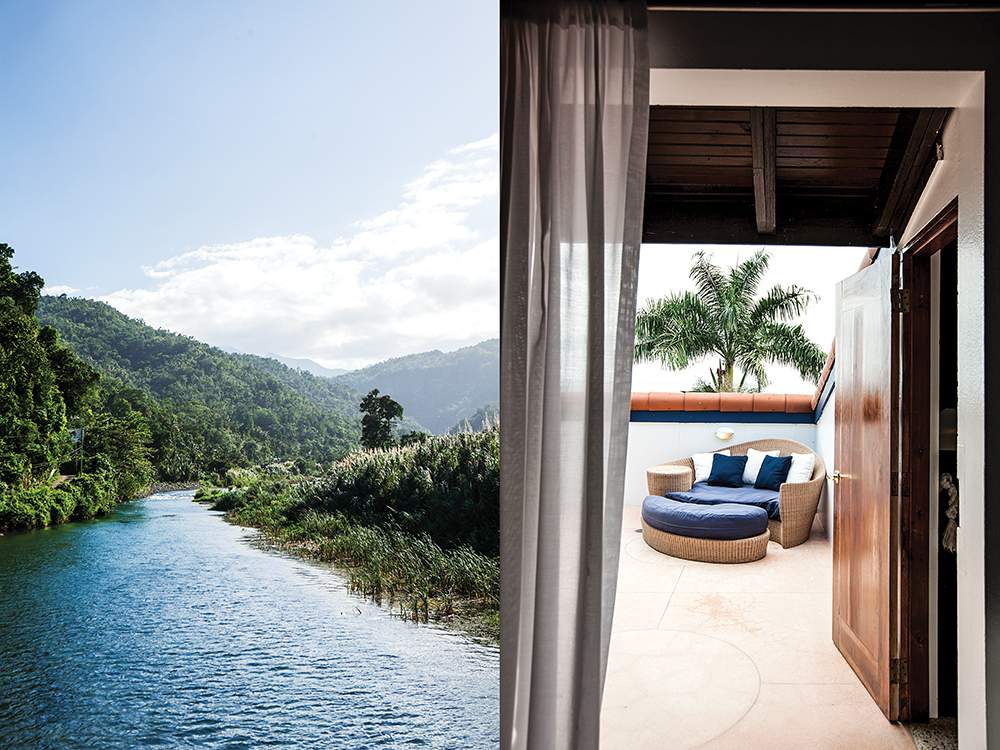
A two-hour drive from Kingston or a four-hour drive east of Montego Bay, Portie is not for the visitor who wants the all-inclusive with the swim-up bar or shops selling stylish bikinis and sun hats. It's for the person who wants to hike up a spectacular river, listen to traditional Jamaican music, eat jerk and drink white rum with the locals. In other words, it's not the Jamaica most people know.
Baker was here in 1986, drawn by the beauty and seclusion. In 1990, he opened the recording studio, where the likes of Amy Winehouse, Bjørk, Drake, Katy Perry and Florence and the Machine have since recorded. In 2007, he built more cabanas and opened the doors to the public. Keeping the Geejam hotel open was a slog — at first. "A little-known artist called Banksy came to stay," says Baker. "He stenciled some art on the walls of one of the villas [Sanwood — still there today] and left us with a painting as a thank-you. We sold that painting just to keep open." Now the Geejam is so booked up that Baker is adding 15 cabanas (more affordable than those there now) and has refurbished two sprawling, more high-end villas above the hotel for those who want to come with a family or an entourage and remain private. At the three-bedroom Panorama Villa, so named for its 180-degree view of the sapphire Caribbean, ocean breezes waft between the orange designer chairs, and pop art dots the walls. It comes with a pool, a chef and a staff of its own.
But not all sides of Portie's renaissance involve glitz, celebrity and money. Locals are also bringing back excellence, and a great example is Soldier Camp restaurant. To get there takes navigating the dirt backstreets of the town, but it's worth the search to end up in Everold Daley's backyard restaurant, sitting on bamboo benches, eating crayfish or shrimp cooked in fresh coconut. "I came home from serving in the U.S. military and was sad at what had happened to Jamaican food," Daley says. "I couldn't find meals like my grandmother made; everything was cooked with oil and MSG. And so I built some tables out back and use recipes from the old-timers. The freshest meat, seafood, fruit and vegetables. That's all it takes." A meal for two cost us $45 (with several rum cocktails) and was the best meal I had in Jamaica.
"There are fewer tourists, no cruise ships, no chain hotels or restaurants and better beaches. And the locals are friendly to outsiders."
East of Portie is Boston Bay, the itty-bitty town that claims to be the original home of jerk spice. There's a cluster of colorful, cobbled-together roadside jerk shacks serving chicken, pork, sausage and homemade white rum at rickety wooden tables. All Jamaican guidebooks will insist you eat here, but pay heed: The persuasive vendors are smooth, and it's easy to forget to inquire about pricing and portion sizes — and be oversold and overcharged. (We didn't ask, and the lunch cost more than $100.)
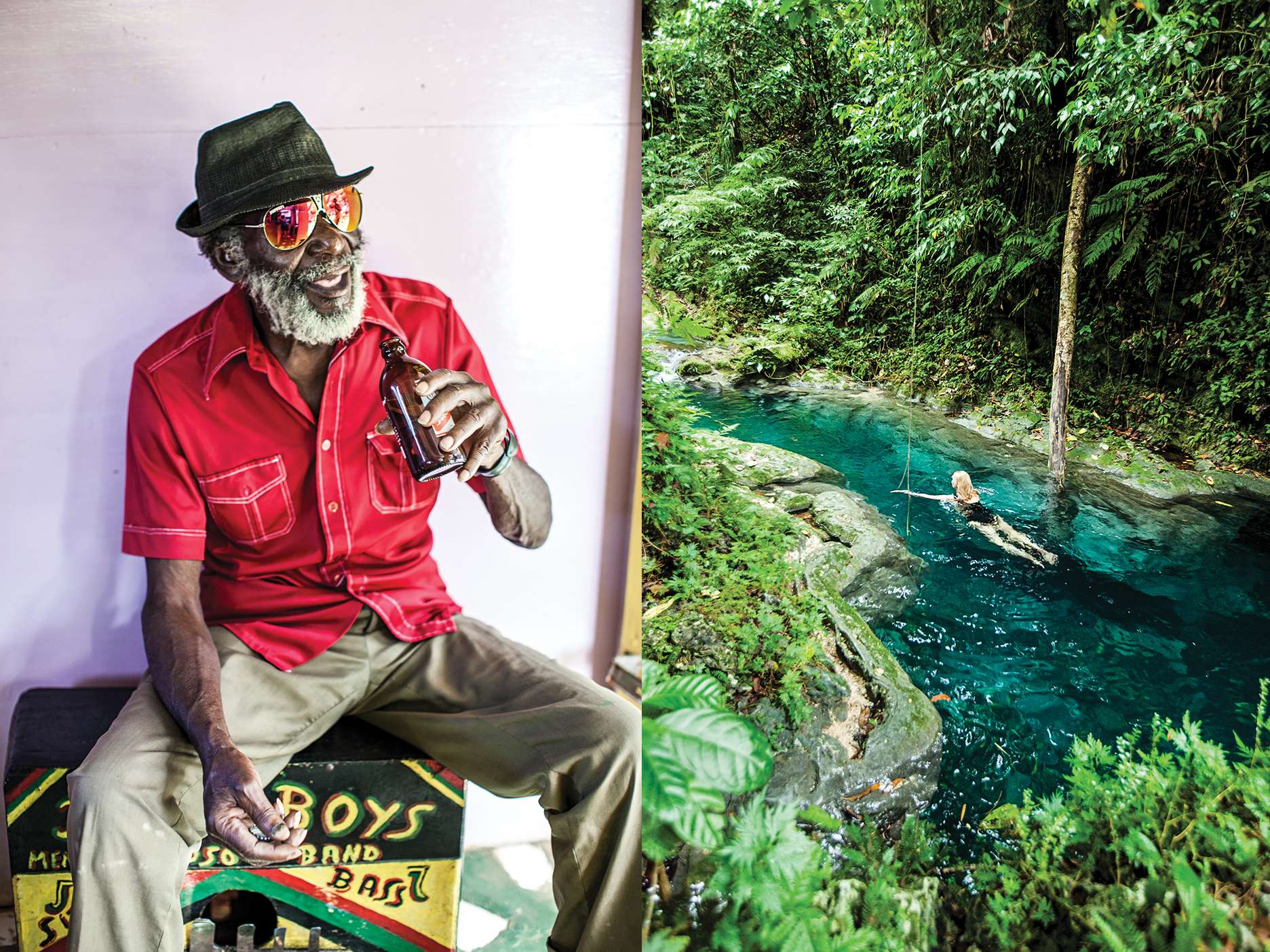
Another tourist staple is the Blue Lagoon, known as the backdrop for movies like Cocktail, Club Paradise and, you guessed it, The Blue Lagoon. But a more genuine experience is driving east to Reach Falls, wearing a bathing suit and running shoes that you don't mind getting wet. Hire a guide and hike up a spilling waterfall with a series of swimming holes and underwater tunnels. Unlike the Blue Lagoon, where the touts are ferocious, the infrastructure here is earnestly government run (part of the new money arriving with revitalization), and no touts are allowed. It's a verdant tropical setting, like you can imagine all of Jamaica once was.
Returning from the waterfall, head to the Bushbar at Geejam for some celebrity spotting and, on a Friday night, to hear the newly reassembled Jolly Boys, a mento band named by Errol Flynn himself, back in the day when they played at his private parties. This group of septuagenarians is, as lead singer Albert Minott says, "bringing back the glamour to Port Antonio. We made Errol Flynn jolly, and now we're going to do it again." Having lived through the heyday and the collapse, no one better represents the spirit of this place than these four men. "We've waited a long time for Portie to come back to life," Johnny Henry, the grinning 78-year-old mento-box player, says.
He's just in time.
